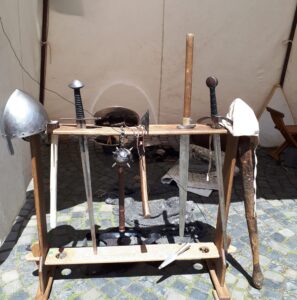Canterbury Tales – Revisited
Oh dear.
It’s been a long time since I read the Canturbury Tales (a collection of twenty-four stories in verse, written in Middle English by Geoffrey Chaucer between 1387 and 1400). I was still a student of English and history at the time. In the “Tales”, a group of pilgrims each tell a story. An early anthology, so to speak.
Now I’ve picked up the audiobook as a refresher. Listened to “The Knight’s Tale”. Well, there’s a difference between reading and interpreting a literary work at university and simply enjoying it again. Or trying to.

This is now my non-literary summary of “The Knight’s Tale” from my current perspective. And yes, I realise that Mr Chaucer probably found the tale just as ridiculous when writing it, as I do when reading or listening to it.
Theseus, King of Athens (King? Really?) has just defeated the Amazons and taken their queen/commander Hippolyta as his wife. The fact that she might not think that so great is not mentioned in a single word.
Men.
A bunch of weeping widows from Thebes (Greece, not Egypt) stop the king and ask for help (not for Hippolyta, of course) because an evil tyrant (i.e. not the good tyrant who captures female army commanders and forces them into marriage) is mean enough to deny their late husbands who have died in battle an honourable burial, preferring to leave the disposal to the dogs.
Bad style. And clearly a reason to wage war on Thebes immediately and leave a few more corpses behind, whose burial presumably no one cares about either.
Men.
Two almost dead young men, the Thebans Palamon and Arcite, are nursed back to health and then thrown into the Athenian dungeon to rot for life because they were defending their own city. (Theseus here displays moral concepts reminiscent of Mr Putin).
From there they see Theseus’ sister, the blonde Emelye, and fall madly in love with her. They are both rotting away in the dungeon at that moment, but have nothing better to do than to immediately fight to the death (well, almost) over the question who is more in love with her and thus would have a right to her if… yes, if they weren’t rotting away in the dungeon for life. (Too bad, though maybe not for Emelye)
Men.

Then Arcite is pardoned, while Palamon continues to languish in the dungeon (bad), but at least gets to see the blonde Emelye from afar (good). Arcite is freed and returns to Thebes (good), where he languishes away in lovesickness. You remember: the blonde Emelye, whom he may now never see again. (Bad)
He, the nobleman, sneaks back into hostile Athens (stupid) and hires himself out as a servant (the disgrace!) just to be able to continue seeing the blonde Emelye. Due to the class difference, however, no contact is ever made. (Oh courtly love…)
Arcite might be the prototype of the stalker.
Years go by. One day, Palamon manages to escape from his dungeon. He hides himself in a bush in the forest when Arcite laments his great love affliction to this bush. (So faithful.)
Confrontation. The two old friends meet again, and immediately try to clobber each other to death with whatever weapons they can lay their hands on (in a shrubbery). They are interrupted by Theseus and his court riding out to hunt. (The forest probably only has the one bush).
Enlightened as to what this is all about, the wonderful Theseus decides that it’ll much fairer if they ride home free (so nice) and each come back with a fighting force of 100 knights so they can fight it out in style.
Men.
At this point, someone could have asked Emelye if she even wants one of those two morons. But of course that doesn’t happen.
The noble contest ensues with 100 fighters on each side. There is a certain amount of bloodshed. Very splendid, the whole thing. Theseus has spared no expense and effort to give the noble slaughter a jolly festive setting.
Men!
Meanwhile, Emelye prays to the goddess Diana that she may please PLEASE remain a virgin. Quite understandable, that. But Diana has different plans, especially since Mars and Venus are in the Palamon and Arcite fan clubs respectively. I imagine them with little flags in the front row of the stands.
Gods!!!!
One of them wins. Believe me, it doesn’t matter who.
The winner gets the presumably totally enthusiastic Emelye, as his wife. Again no one thinks of asking her. And now they live happily ever after.
Who disposes of all the bodies is not mentioned.
Men!